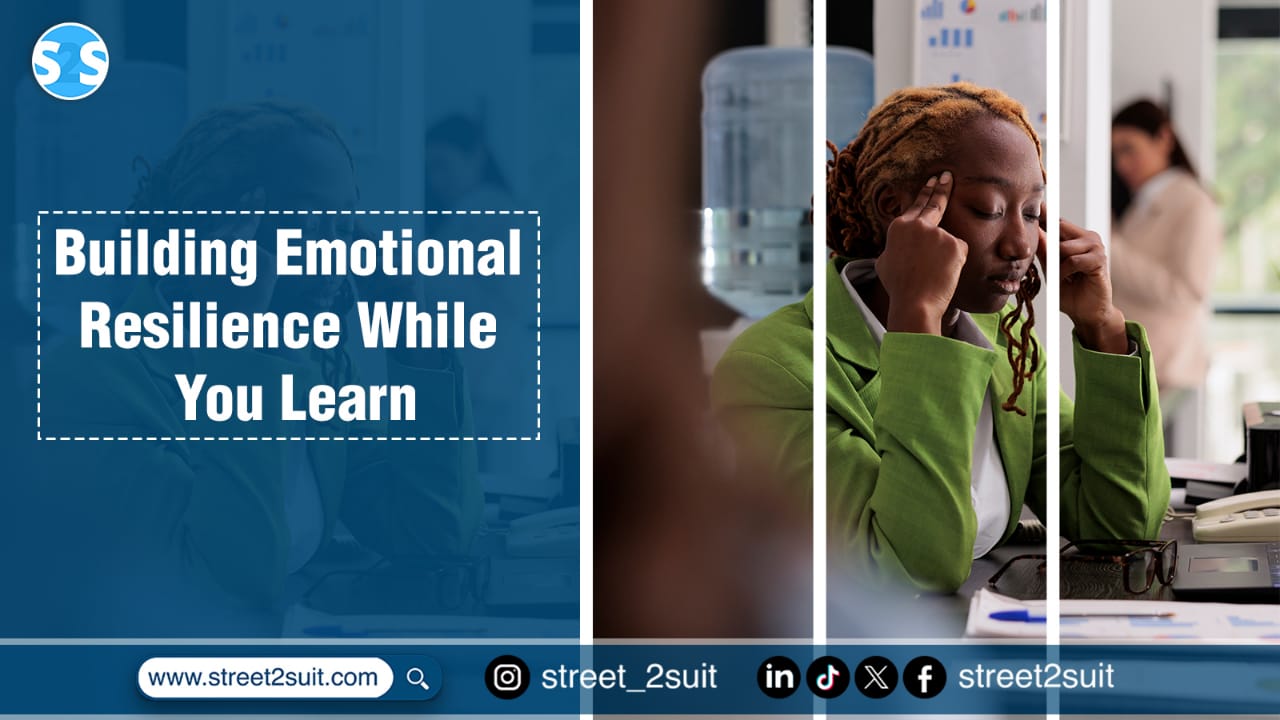To be honest, learning isn’t always the glamorous, TikTok-worthy journey we like to imagine. Sure, we picture ourselves taking snacks while breezing through textbooks, mastering new skills, or acing online courses. But the reality? Learning can be messy. It can test your patience, bruise your ego, and sometimes make you wonder why you even started.
This is where emotional resilience comes in. It’s the ability to keep going when learning feels frustrating, overwhelming, or slow. Resilience isn’t about ignoring the struggle; it’s about facing it, managing it, and bouncing back stronger. And in today’s world, where the need to constantly upskill, reskill, or adapt never ends; emotional resilience is just as important as knowledge itself.
The riddle now is how do you actually build resilience while you learn? Let’s break it down.
1. Accept That Struggle Is Part of the Process
The first step is mindset. Many people quit learning something new because they expect progress to always be smooth. They assume that struggling means they are not “smart enough” or “cut out for it.” In reality, struggle is a normal part of the learning process.
Think about how children learn to walk. They stumble, fall, and bump into things countless times. But they don’t quit. They don’t say, “Well, walking clearly isn’t for me.” They keep trying until their muscles catch up.
Learning as an adult is no different. Struggle doesn’t mean failure, it means growth is happening.
2. Manage the Voice in Your Head
One of the biggest barriers to resilience isn’t the subject itself, it’s the internal critic that whispers:
- “You’re not good enough.”
- “You’re too slow.”
- “Other people are better than you.”
If you listen too closely to that voice, you’ll lose momentum. Instead, practice self-compassion. Remind yourself:
- Everyone struggles when learning something new.
- Progress, not perfection, is the goal.
- You’re allowed to take time.
Resilient learners don’t silence their inner critic completely or gives it a final say.
3. Break Learning into Small, Manageable Steps
One major cause of burnout while learning is trying to take in too much at once. Imagine trying to eat a whole loaf of bread in one bite, you’d choke. Learning works the same way.
- Instead, break tasks into smaller chunks
- Instead of “master Excel,” focus on “learn how to use formulas.”
- Instead of “become fluent in Spanish,” start with “learn 10 new words today.”
Small wins add up, and celebrating them keeps your motivation alive. Resilience isn’t about one giant leap, it’s about a thousand little steps.
4. Learn How to Recover from Setbacks
Setbacks are inevitable. You might fail a test, forget something you studied, or feel lost in a lecture. What separates resilient learners from those who quit is recovery.
Instead of dwelling on failure, ask yourself:
- What went wrong?
- What can I do differently?
- What did I still learn from this attempt?
Recovery is about adjusting your approach instead of abandoning the journey. Think of resilience as a rubber band, you stretch, you snap back; but you don’t break.
5. Build a Support System
Learning can be lonely if you try to do it all by yourself. Resilience grows when you surround yourself with encouragement. Find:
- A study buddy.
- A mentor who’s already been through the same journey.
- Online communities where people share tips and struggles.
Sometimes, just knowing you’re not alone in the struggle makes it easier to keep going. Encouragement is fuel for resilience.
6. Take Care of Your Body While You Learn
It’s tempting to think resilience is purely mental, but your physical state plays a big role. Poor sleep, bad eating habits, and lack of movement drain your emotional reserves.
When you’re tired and hungry, even small challenges feel overwhelming. When you’re well-rested and energized, you’re better equipped to handle setbacks.
So, take breaks, hydrate, stretch, and sleep. A resilient mind needs a healthy body to back it up.
7. Practice Emotional Regulation
Learning often brings emotions like frustration, anxiety, or even embarrassment. Resilient learners don’t avoid these emotions, they manage them.
Simple techniques help:
- Take deep breaths when you feel overwhelmed.
- Journal your frustrations and wins.
- Step away from your desk for five minutes to reset.
By practicing emotional regulation, you keep negative emotions from spiraling out of control and sabotaging your progress.
8. Focus on Growth, Not Perfection
Perfectionism is the enemy of resilience. If you expect flawless performance from yourself, every mistake feels like a disaster. Instead, shift your mindset toward growth.
Ask yourself: Am I better today than I was yesterday? If the answer is yes, even by a little you’re succeeding. Growth is often invisible day by day, but if you zoom out, the progress becomes obvious.
9. Celebrate Small Victories
Resilience doesn’t just come from powering through tough times. It also comes from recognizing your achievements. Celebrating milestones either big or small reminds you why you started and motivates you to keep going.
Finished a chapter? Celebrate. Solved a tricky problem? Celebrate. Managed to sit down and study for 30 minutes on a hard day? That’s worth celebrating too. Resilient learners reward effort, not just outcomes.
Conclusion
Finally, resilience thrives on purpose. When learning gets tough, remind yourself why you’re doing it. Are you studying to advance your career, gain independence, or fulfill a personal dream? That bigger picture will carry you through the difficult days.
Think of it this way: the struggle you’re facing now is an investment in your future self.
Building emotional resilience while you learn isn’t about avoiding failure, it’s about changing your relationship with it. It’s about turning frustration into fuel, setbacks into stories, and small steps into long-term victories.
Resilient learners accept discomfort, stay compassionate with themselves, lean on support systems, and celebrate progress along the way. They don’t see learning as a test of talent but as a journey of growth.
So the next time you hit a tough chapter, stumble on a concept, or feel like giving up, remind yourself: every struggle is shaping not just your knowledge but your strength.
Receive the latest job and career updates in your inbox, every week!


